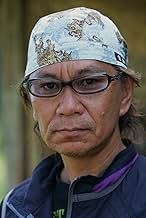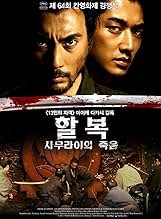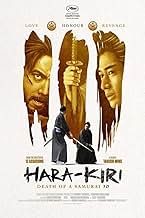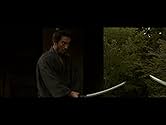PUNTUACIÓN EN IMDb
7,3/10
9,8 mil
TU PUNTUACIÓN
Una historia de venganza, honor y deshonor, centrada en un pobre samurái que descubre el destino de su yerno ronin, desencadenando una tensa venganza contra la casa de un señor feudal.Una historia de venganza, honor y deshonor, centrada en un pobre samurái que descubre el destino de su yerno ronin, desencadenando una tensa venganza contra la casa de un señor feudal.Una historia de venganza, honor y deshonor, centrada en un pobre samurái que descubre el destino de su yerno ronin, desencadenando una tensa venganza contra la casa de un señor feudal.
- Dirección
- Guión
- Reparto principal
- Premios
- 6 nominaciones en total
Eita Nagayama
- Motome Chijiiwa
- (as Eita)
Gorô Daimon
- Priest
- (as Goro Daimon)
Reseñas destacadas
It would've taken guts to remake one of the most acclaimed Japanese films of all time (1962's Harakiri), but then again, no one could accuse Takashi Miike of being a gutless filmmaker. I was curious to see this because some of Miike's best films are remakes or updates of stories that have already been adapted to film (like 13 Assassins and Graveyard of Honour).
This remake really follows the original perhaps a little too closely. I think it's just a few minutes shorter, and I can really only think of one scene that was in the original that wasn't in this. Visually, it replicates Masaki Kobayashi's style really well, but maybe part of me was hoping that Takashi Miike would do something a little more out-there or unexpected. Instead, he chose to be reverent to the original, but then again, it is a classic film that deserves reverence.
There's one infamous scene from the original that feels even harder to watch here, and I think the climax shakes things up a little too, to mixed effect (the final fight is fairly different). Otherwise, the story and all the characters are near-identical, and anyone familiar with the 1962 version is unlikely to find too many surprises here.
It's strange to try and review this, because it is a high-quality film... yet it's based on a high-quality classic that still holds up extremely well, so I'm not entirely sure what the rationale was behind this. For those who want to see a more modern-looking version of Harakiri in colour instead of black and white, this is very well-made and watchable, but I feel like the original is still more worthy of being watched first, for anyone unfamiliar with either film.
This remake really follows the original perhaps a little too closely. I think it's just a few minutes shorter, and I can really only think of one scene that was in the original that wasn't in this. Visually, it replicates Masaki Kobayashi's style really well, but maybe part of me was hoping that Takashi Miike would do something a little more out-there or unexpected. Instead, he chose to be reverent to the original, but then again, it is a classic film that deserves reverence.
There's one infamous scene from the original that feels even harder to watch here, and I think the climax shakes things up a little too, to mixed effect (the final fight is fairly different). Otherwise, the story and all the characters are near-identical, and anyone familiar with the 1962 version is unlikely to find too many surprises here.
It's strange to try and review this, because it is a high-quality film... yet it's based on a high-quality classic that still holds up extremely well, so I'm not entirely sure what the rationale was behind this. For those who want to see a more modern-looking version of Harakiri in colour instead of black and white, this is very well-made and watchable, but I feel like the original is still more worthy of being watched first, for anyone unfamiliar with either film.
Takashi Miike's second straight tribute to the samurai genre is a well-crafted and finely honed object. It's more consistent than Miike's previous samurai film, 13 Assassins, although that also means it lacks anything as great as that film's final battle. But what sets Hara-Kiri apart is its willingness to not just offer a pastiche of these films but genuinely question their values in a way that is still challenging to the contemporary viewer.
Through a series of events told partially in flashbacks, Hara-Kiri poses the question of how relevant our values are -- whether they be highly codified values like honour or the more nebulous instincts that guide us today -- in the face of human suffering. The ronin that we see humiliated and killed in the first act is not guilty of breaking some arcane samurai bylaw but of doing something most of us would find disgraceful. But as the film goes on it argues that we should hold compassion even for people such as this, and that honour is ultimately irrelevant in the face of social suffering. In an age of recession and austerity, where so many try to cling to their ideas of what they or other people "deserve", this is an important message.
It's an easy film to appreciate and a difficult one to love -- there's a kind of coldness to this set of Miike's movies that seems out of place with the gonzo enthusiasm of his earlier work. And doubtlessly it will be too slow and cerebral for some. But its critique of not just a canonized genre but the way in which we view ethics makes it well worth seeing.
Through a series of events told partially in flashbacks, Hara-Kiri poses the question of how relevant our values are -- whether they be highly codified values like honour or the more nebulous instincts that guide us today -- in the face of human suffering. The ronin that we see humiliated and killed in the first act is not guilty of breaking some arcane samurai bylaw but of doing something most of us would find disgraceful. But as the film goes on it argues that we should hold compassion even for people such as this, and that honour is ultimately irrelevant in the face of social suffering. In an age of recession and austerity, where so many try to cling to their ideas of what they or other people "deserve", this is an important message.
It's an easy film to appreciate and a difficult one to love -- there's a kind of coldness to this set of Miike's movies that seems out of place with the gonzo enthusiasm of his earlier work. And doubtlessly it will be too slow and cerebral for some. But its critique of not just a canonized genre but the way in which we view ethics makes it well worth seeing.
The Japanese cinema used to be much more powerful in the past. This remake of classic masterpiece Harakiri is far worse in many ways. It toned down criticism of authority, that is the core of the original movie. The central story is overdrawn, and it does not bring much new. What is new in this presentation is almost always at a loss, spare a somewhat simpler structure. Acting is also better in the original. But what is most annoying, is that some key subtle points are missing in this version, almost as if they were not understood, or worse yet, almost if hypocrisy of the authorities is to be whitewashed. It is far less powerful rendering of the story, it lacks authenticity that Kobayashi had with his then contemporary comments. By all means, if you can, see the original first. One of the least justified and worst remakes. However, when the original is so great, this lazy if not outright stupid remake still leaves us with a somewhat shabby but not too bad a movie. It is a disappointment coming from a director that had better days, and especially from a cinematography that seems to have grown tired, and has been surpassed by South Korea but also China to an extent.
Where does mercy fit in with the esprit de corps of a warrior class? Can there be honor without it? These are interesting questions raised in director Takashi Miike's poignant remake of the 1962 classic "Harakiri". This film may not satisfy the audience for slashing, body-count samurai movies because the emphasis is on mood and character but there are a number of things to recommend this film. "Hara-Kiri:Death of a Samurai" is beautifully photographed by Nobuyasu Kita and has laudable performances. Ebizo Ichikawa is Hanshiro a samurai with a young daughter of marriageable age. Hanshiro has adjusted to living in a time of peace. He isn't a wealthy man but seems happy and content making a living doing the odd job here and there. Ichikawa is wonderful in this role giving great weight and humanity to the character. He is a memorable samurai. Eita is Motome a young samurai who hasn't adjusted as well. He has been unable to find employment and so enters the house of a great lord asking for permission to commit harakiri in the courtyard and thus achieve an honorable death. Hikari Mitsushima is very affecting as Hanshiro's daughter, Miho. When I approached the theater showing this film I noticed someone walking away with teary eyes. I can't recall the last time that happened but after seeing "Hara-Kiri:Death of a Samurai" I understood why someone would be so moved.
This is the film about life and how hard it can be. What a true warrior should aim for and what does it mean to be a man of action. Very interesting film with an exceptional rhythm of story telling. At first flow of the film looked too slow for me, but after warming up I did truly enjoy it. As I got very sharp emotional feelings form this very melodramatic remake of Original Harakiri (1962), at the and of the film I've got a special gift, something which will be an interesting suggestion for life and a different angle of view for it.
¿Sabías que...?
- CuriosidadesThe first 3D title ever to be shown in official selection at the Cannes Film Festival.
- PifiasAs the wooden wakizashi is pushed into the stomach (after the tip snapped off), you can see that the blade is sliding into the handle.
- Citas
Hanshirô Tsugumo: A warrior's honor is not something simply worn for show!
- ConexionesFeatured in At the Movies: Cannes Film Festival 2011 (2011)
Selecciones populares
Inicia sesión para calificar y añadir a tu lista para recibir recomendaciones personalizadas
- How long is Hara-Kiri: Death of a Samurai?Con tecnología de Alexa
Detalles
- Fecha de lanzamiento
- Países de origen
- Sitios oficiales
- Idioma
- Títulos en diferentes países
- Hara-Kiri: Death of a Samurai
- Empresas productoras
- Ver más compañías en los créditos en IMDbPro
Taquilla
- Recaudación en Estados Unidos y Canadá
- 75.688 US$
- Fin de semana de estreno en EE. UU. y Canadá
- 10.920 US$
- 22 jul 2012
- Recaudación en todo el mundo
- 5.435.358 US$
- Duración
- 2h 8min(128 min)
- Color
- Mezcla de sonido
- Relación de aspecto
- 2.35 : 1
Contribuir a esta página
Sugerir un cambio o añadir el contenido que falta































